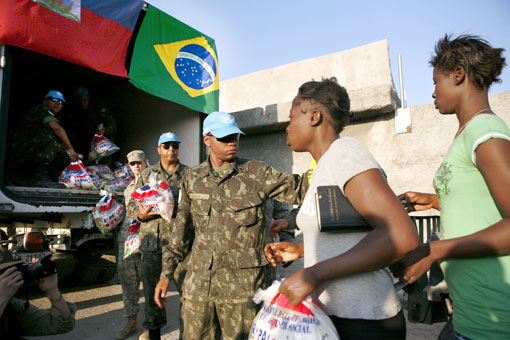The emergence of new donors is transforming the landscape of humanitarian aid. Along with China and India, Brazil – once a recipient of the United Nations’ World Food Program’s (WFP) assistance – is an increasingly visible provider of humanitarian aid. In 2011, WFP distributed more than one million tons of food produced by Brazilian farmers, making it one of the ten largest donors. An even larger quantity of Brazil’s humanitarian aid was provided bilaterally, helping Brazil project influence in a growing number of regions across the world and promote its successfully applied domestic social policies that have contributed to reducing poverty at home.
Yet given the recent nature of Brazil’s strategy of humanitarian cooperation, little is known about Brazil’s motives, priorities and internal decision making processes. It is not clear whether Brazil’s large-scale humanitarian engagement in Haiti over the past years and its more recent efforts in Palestine and Somalia, for example, are ad hoc measures that are unlikely to find repetition, or whether they are the beginning of a broader strategy, turning humanitarian aid into one of Brazil’s more important foreign policy tools. This is not merely an important question for Brazil and its region, but also for the way we think about the future of humanitarian aid and about efforts by established actors to set up a tight network of rules and norms about how to deliver humanitarian aid. In addition, Brazil’s strategy vis-à-vis today’s humanitarian aid system can provide important clues about its approach to the institutions that form today’s global liberal order in general, showing in how far Brazil seeks to integrate in, modify or undermine current structures.
Given how recent Brazil’s activities in this area are – it only truly began to provide humanitarian aid in 2006 – very little has been published about the issue, and students’ master and doctoral theses at Brazilian universities provide useful insights. For example, Patrícia Tambourgi, a masters student in international relations at the Pontifical Catholic University of São Paulo (PUC-SP) has written an interesting thesis detailing Brazil’s emergence as a humanitarian donor between 2006 and 2010, a time during which Brazil’s contribution increased 170-fold (even though the total amount of around US$ 100 million remained well below 1% of GDP).
Tambourgi starts out by recognizing how difficult it is to obtain coherent data – a problem scholars who focus on aid flows provided by emerging powers often struggle with. Contrary to what many think, the Brazilian government has no active interest in hiding information- rather, the degree of institutionalization is still low, making it hard even for policy makers to present reliable figures. In a similar way, data presented by Indian or Chinese policy makers are often hard to categorize, mixing investment, development aid or humanitarian aid in a way that makes it impossible to disaggregate it. This generally leads analysts to underestimate the role of emerging powers as humanitarian donors.
Yet in her thesis, the author makes clear how much the process of multipolarization has affected the landscape of humanitarian aid. While only 15 countries offered help in several humanitarian crises in the 1990s (e.g. in Bosnia), this number rose to almost 100 during the 2004 Tsunami that affected several regions in Asia.
Tambourgi provides a well-researched analysis and lots of useful data for the reader to gain a more profound grasp of the characteristics and motives of Brazilian humanitarian aid. For example, while Brazil initially preferred bilateral aid, it now increasingly focuses on trilateral aid. In addition, its geographical focus expanded, although its focus remains Latin America and the Caribbean. She also explains how Brazil gradually ceased to use the term “humanitarian assistance”, preferring the less hierarchy-laden “humanitarian cooperation”. At the same time, her argument that Brazil’s aid does not include conditionalities fails to take into account that even Western humanitarian aid is – contrary to development aid – free of any conditionalities.
Brazil’s engagement as a provider of humanitarian assistance is too incipient to make any definitive statements about the effectiveness of its approach or the impact it will have on the global landscape of humanitarian aid. Still, given that only a decade ago Brazil was a recipient of aid and had not yet begun to provide humanitarian aid to other countries at all, its progress has been remarkable, changing the way Brazil is perceived abroad and the way the country sees itself. Brazil’s humanitarian strategy thus underlines, more than anything, Brazil’s ambition to play a more important role in international affairs and project global influence.
Read also:
How rising powers are changing humanitarian assistance
Should India still receive development aid?
Brazil in Africa: Bridging the Atlantic?
As Brazil turns into 6th largest economy, unfamiliar challenges loom
Photo credit: Sophia Paris/UN Photo









